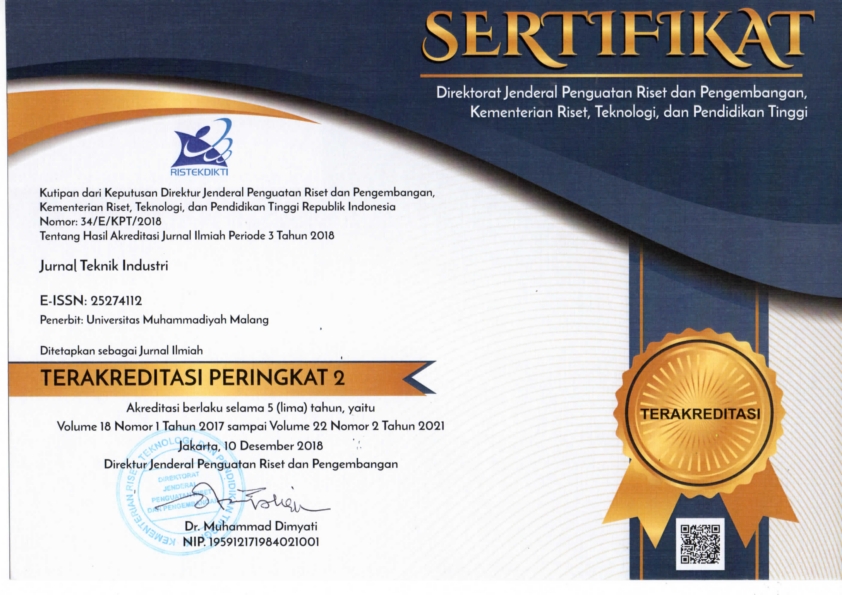Kesuksesan Knowledge Transfer Di Laboratorium Perguruan Tinggi Melalui Pengelompokkan Rekan Kerja Menggunakan Agent-Based Modeling And Simulation
DOI:
https://doi.org/10.22219/JTIUMM.Vol19.No2.205-219Keywords:
Agent-based simulation, complex systems, knowledge transferAbstract
One of aspect that contributes to improving organizations performance is knowledge transfer effectiveness. On the other hand, knowledge transfer is a dynamic interaction between people, process, and environment so that activity related to knowledge transfer categorized as a complex and adaptive process. The use of agent-based modeling and simulation approach is very appropriate in modeling knowledge transfer due to its ability to deal with the dynamic, complex, and adaptive process. Moreover, the agent-based approach has the ability in describing the interaction between the social agent that possess particular behavior. The purposes of this study are to identify the factors that influence the success of knowledge transfer in the university laboratory. In addition, the results show that agent-based modeling and simulation approach can determine the best scenario that can increase the success of knowledge transfer based on grouping of colleagues.Downloads
References
F. Ramadhan and T. Samadhi, "Inter-Organizational Trust and Knowledge Sharing Model Between Manufacturer and Supplier in The Automotive Industry," in Industrial Engineering and Engineering Management (IEEM), 2016 IEEE International Conference on, 2016, pp. 856-860.
L. Argote and P. Ingram, "Knowledge Transfer: A Basis for Competitive Advantage in Firms," Organizational Behavior and Human Decision Processes, vol. 82, pp. 150-169, 2000.
L. Argote and E. Fahrenkopf, "Knowledge Transfer in Organizations: The Roles of Members, Tasks, Tools, and Networks," Organizational Behavior and Human Decision Processes, vol. 136, pp. 146-159, 2016.
F. Ramadhan, R. Soesanto, A. Rizana, A. Kurniawati, and I. Wiratmadja, "Mechanisms for Effective Knowledge Transfer in University Laboratory: An Agent-Based Approach," in Industrial Engineering and Engineering Management (IEEM), 2017 IEEE International Conference on, 2017, pp. 1138-1142.
L. A. Joia and B. Lemos, "Relevant Factors for Tacit Knowledge Transfer within Organisations," Journal of Knowledge Management, vol. 14, pp. 410-427, 2010.
A. Kurniawati, T. Samadhi, I. I. Wiratmadja, and R. P. Soesanto, "The Impact of Source, Recipient, and Tacit Knowledge Characteristics on Tacit Knowledge Transfer Effectiveness," Proceedings of the Asia Pasific Industrial Engineering & Management System 2016, 2016.
T. A. Samadhi and H. Lalu, "Agents-Based Model of Knowledge Sharing among Personnel with Varying Learning Rate in Products Cross-Selling: Case of Indonesia National Bank," in Management of Innovation and Technology (ICMIT), 2014 IEEE International Conference on, 2014, pp. 93-98.
J. H. Holland and J. H. Miller, "Artificial Adaptive Agents in Economic Theory," The American Economic Review, vol. 81, pp. 365-370, 1991.
J. Wang, K. Gwebu, M. Shanker, and M. D. Troutt, "An Application of Agent-Based Simulation to Knowledge Sharing," Decision Support Systems, vol. 46, pp. 532-541, 2009.
S. S. Levine and M. J. Prietula, "How Knowledge Transfer Impacts Performance: A Multilevel Model of Benefits and Liabilities," Organization Science, vol. 23, pp. 1748-1766, 2012.
V. Dignum, F. Dignum, and J.-J. Meyer, "An Agent-Mediated Approach to The Support of Knowledge Sharing in Organizations," The Knowledge Engineering Review, vol. 19, pp. 147-174, 2004.
H. Zhu and B. Hu, "Agent Based Simulation on The Process of Human Flesh Search—From Perspective of Knowledge and Emotion," Physica A: Statistical Mechanics and its Applications, vol. 469, pp. 71-80, 2017.
D. B. Fuller, V. J. M. Ferreira Filho, and E. F. de Arruda, "Oil Industry Value Chain Simulation with Learning Agents," Computers & Chemical Engineering, vol. 111, pp. 199-209, 2018.
V. Albino, N. Carbonara, and I. Giannoccaro, "Innovation in Industrial Districts: An Agent-Based Simulation Model," International Journal of Production Economics, vol. 104, pp. 30-45, 2006.
J. L. Cummings and B.-S. Teng, "Transferring R&D Knowledge: The Key Factors Affecting Knowledge Transfer Success," Journal of Engineering and technology management, vol. 20, pp. 39-68, 2003.
G. P. Huber, "Organizational Learning: The Contributing Processes and The Literatures," Organization science, vol. 2, pp. 88-115, 1991.
J. Rhodes, P. Lok, R. Yu-Yuan Hung, and S.-C. Fang, "An Integrative Model of Organizational Learning and Social Capital on Effective Knowledge Transfer and Perceived Organizational Performance," Journal of workplace learning, vol. 20, pp. 245-258, 2008.
V. J. Marsick and K. E. Watkins, "Demonstrating The Value of An Organization's Learning Culture: The Dimensions of The Learning Organization Questionnaire," Advances in developing human resources, vol. 5, pp. 132-151, 2003.
E. Siemsen, A. V. Roth, and S. Balasubramanian, "How Motivation, Opportunity, and Ability Drive Knowledge Sharing: The Constraining-Factor Model," Journal of Operations Management, vol. 26, pp. 426-445, 2008.
J. M. Howell, D. J. Neufeld, and B. J. Avolio, "Examining The Relationship of Leadership and Physical Distance with Business Unit Performance," The Leadership Quarterly, vol. 16, pp. 273-285, 2005.
R. Van Wijk, J. J. Jansen, and M. A. Lyles, "Inter‐and Intra‐Organizational Knowledge Transfer: A Meta‐Analytic Review and Assessment of Its Antecedents and Consequences," Journal of Management Studies, vol. 45, pp. 830-853, 2008.
T. Schmidt, "Absorptive Capacity-One Size Fits All? A Firm-Level Analysis of Absorptive Capacity for Different Kinds of Knowledge," 2005.
K. K. Law, "The Problem with Knowledge Ambiguity," European Management Journal, vol. 32, pp. 444-450, 2014.
M. L. Sheng, S.-Y. Chang, T. Teo, and Y.-F. Lin, "Knowledge Barriers, Knowledge Transfer, and Innovation Competitive Advantage In Healthcare Settings," Management Decision, vol. 51, pp. 461-478, 2013.
M. J. North and C. M. Macal, Managing Business Complexity: Discovering Strategic Solutions with Agent-Based Modeling and Simulation: Oxford University Press, 2007.
J. Banks, Handbook of Simulation: Principles, Methodology, Advances, Applications, and Practice: John Wiley & Sons, 1998.











